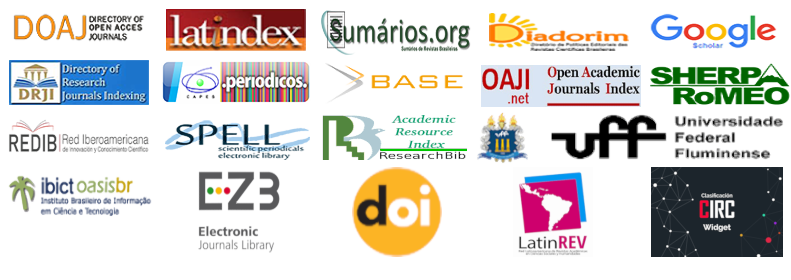Mulher macho, não senhor!
A Case Study about the Perception of Female Managers and their Peers about the Female Management Model
DOI:
https://doi.org/10.20401/rasi.6.3.352Keywords:
gestão organizacional, gestão feminina, estudo de caso, análise de conteúdoAbstract
This study aims to analyze the perception of managers and their peers about the characteristics of a managerial model and how the gender is associated with this model, the study seeks to discuss together the theory if the female management model is impeditive to high positions direction management. Therefore, the concept of organizational management and current studies on women's management were addressed in the theoretical framework. As a case study, this work is characterized as qualitative and descriptive research, with data collection through semi-structured interview and deductive-verifier-objective analysis, being configured as content analysis. As for the limitations, the managers' run-time routine results in short interviews as well as the number of managers available in the organization, reflecting on a limited number of interviews.
Downloads
References
Borba, A. M. D., & Luz, S. P. D. (2002). Formação continuada para docentes do ensino superior: apontamentos para novas alternativas pedagógicas. Pró-Reitoria de Ensino, Universidade do Vale do Itajaí. Itajaí.
Bueno, J. M., Domingues, C. R., & Bueno, G. (2016). Feminilidade na gestão: sensibilidade e sensualidade na percepção de mulheres gerentes em uma instituição financeira. Revista Alcance, 23(2), 142-155. https://doi.org/10.14210/alcance.v23n2.p142-155
Cárdenas, M. C., Eagly, A. H., Salgado, E., Goode, W., Heller, L. I., Jaúregui, K., ... Tunqui, R. C. (2014). Latin American female business executives: An interesting surprise. Gender in Management, 29(1), 2-24. https://doi.org/10.1108/GM-06-2013-0067.
Carlomagno, M. C., & da Rocha, L. C. (2016). Como criar e classificar categorias para fazer análise de conteúdo: uma questão metodológica. Revista Eletrônica de Ciência Política, 7(1).
Denzin, N. K., & Lincoln, Y. S. (2006). O planejamento da pesquisa qualitativa: teorias e abordagens. In O planejamento da pesquisa qualitativa: teorias e abordagens.
Diniz, A. P. R., SILVA, A. D., & Menezes, R. S. S. (2011). Entre “Maria” e “Eva”: as representações sociais de executivas sobre a profissão. IN: XXXV Encontro Nacional da Anpad, Rio de Janeiro.
De Oliveira, S. B. (2017). Instrumentos de gestão pública. Rio de Janeiro: Editora Saraiva.
Ferguson, K. E. (1984). The feminist case against bureaucracy (Vol. 105). Temple University Press.
FERREIRA, L., SILVA, A., SILVA, D., & SOUSA, T. (2017). Mulheres em cargos de gerência e os desafios em conciliar vidas pessoal e profissional: um estudo em hotéis de São Luís-MA, Brasil. Revista Turismo & Desenvolvimento (RT&D)/Journal of Tourism & Development.
Ferreira, V. C. P. (2015). Modelos de gestão. Editora FGV.
Fleury, M. T. L., & Fleury, A. (2001). Construindo o conceito de competência. Revista de administração contemporânea, 5(SPE), 183-196.
Gil, A. C. (2010). Como elaborar projetos de pesquisa. 5ª ed. São Paulo: Atlas.
Godoy, A. S. (1995). Introdução à pesquisa qualitativa e suas possibilidades. Revista de administração de empresas, 35(2), 57-63.
Henderson, P. A., de Araújo Ferreira, M. A., & Dutra, J. S. (2016). As barreiras para a ascensão da mulher a posições hierárquicas: um estudo sob a óptica da gestão da diversidade no Brasil. Revista de Administração da UFSM, 9(3), 488-505.
Instituto Brasileiro de Geografia e Estatística. (2017). Pesquisa Nacional por Amostra de Domicílios: síntese de indicadores 2013. 2a Edição. Rio de Janeiro.
Instituto Brasileiro de Geografia e Estatística. (2018). Estatísticas de Gênero - Indicadores sociais das mulheres no Brasil. Estudos e pesquisas - informação demográfica e socioeconômica, n.38,2018. Disponível em: https://agenciadenoticias.ibge.gov.br/media/com_mediaibge/arquivos/9d6f4faeda1f1fb7532be7a9240cc233.pdf. Acessado em 13/08/2018.
Kanan, L. A. (2010). Poder e liderança de mulheres nas organizações de trabalho. Organizações & Sociedade, 17(53).
Machado, H. V. (2006). Expressão emocional no exercício da atividade empreendedora por mulheres. Organizações & Sociedade, 13(38), 59-72. http://dx.doi.org/10.1590/S1984-92302006000300004.
Moresi, E. (2003). Metodologia da pesquisa. Brasília: Universidade Católica de Brasília, 108, 24.
Mozzato, A. R., & Grzybovski, D. (2011). Análise de conteúdo como técnica de análise de dados qualitativos no campo da administração: potencial e desafios. Revista de Administração Contemporânea, 15(4), 731-747.
Villarta-Neder, M. A. (2013). Tudo Muda, mas Nada Muda?! O Discurso sobre a Imagem da Mulher nas Organizações. Encontro da ANPAD.
Silva Júnior, C. P. D., & Martins, O. S. (2017). Mulheres no conselho afetam o desempenho financeiro? Uma análise da representação feminina nas empresas listadas na BM&FBOVESPA. Sociedade, Contabilidade e Gestão, 12(1).
Silveira, J. C. (2017). Forte como... uma mulher: uma análise dos desafios enfrentados pelas mulheres no mercado de trabalho.
Souza, C. G. D. Mulheres de negócios comandam? Uma análise do discurso a partir do editorial SEBRAE sobre a mulher. Signum: Estudos da Linguagem, 20(3), 213-239.
Downloads
Published
Issue
Section
License
Copyright (c) 2020 Review of Administration, Society and Innovation

This work is licensed under a Creative Commons Attribution 4.0 International License.
RASI, in accordance with Law No. 9,610 of February 19, 1998, which amends, updates and consolidates Brazilian copyright law and makes other provisions, adopts the following conditions of the Copyright Assignment:
1. RASI maintains, with the transfer of copyrights, the possession of rights over the content published;
2. The author retains his moral rights of the content, including the right to be identified as the author whenever the content is published;
3. Despite the attribution of copyright, the author retains the right to reuse the material in future collections of his own work without encumbrance. The acknowledgments of the previous publication in the RASI are the only requirements in such cases;
4. The author may make photocopies of the content, or distribute it by electronic mail or fax, provided that they are intended for their own classes and for the purpose of meeting research objectives, provided that: (a) such copies are not resold and (b) reference to the original source of the publication and the name of the RASI are clearly indicated on all copies made of the document.











